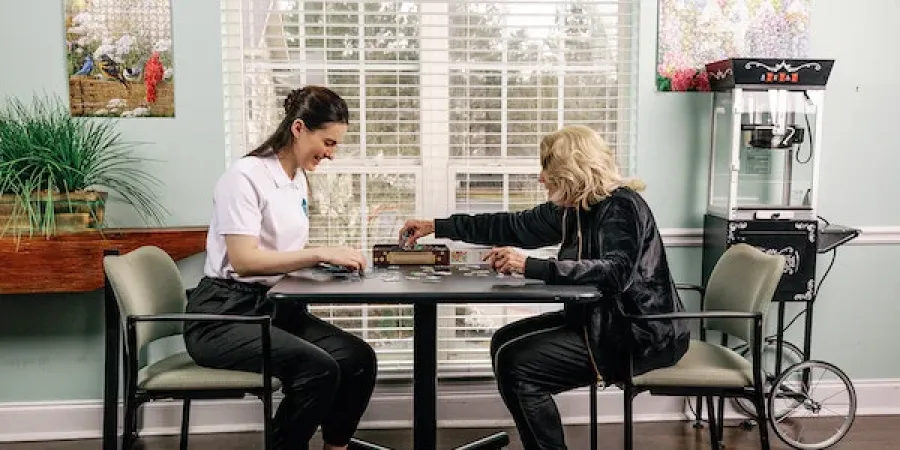The Best In-Home Health Care Agency in Stockbridge
Our In-Home Caregivers are here for you and your loved ones. Get started today!
Providing In-Home Care in Stockbridge, GA
For Almost 20 Years
Serving Stockbridge for almost 20 years, 4 Seasons Home Care (previously Southern Crescent Care) has been a reliable partner for numerous families in the area. Our unwavering dedication to delivering outstanding in-home care services has cemented our reputation as a cornerstone of the Stockbridge community.
With a profound understanding of Stockbridge seniors' distinct needs, we customize our in-home care services to uplift their quality of life, ensuring they enjoy their golden years in the sanctuary of their homes. At 4 Seasons Home Care, we go beyond mere caregiving; we craft cherished memories, promote autonomy, and provide solace to seniors and their families alike.
We pride ourselves on being more than just caregivers; we're your allies in safeguarding your family member's health and happiness. Reach out to us today for a complimentary consultation and immerse yourself in the warmth, empathy, and proficiency that has characterized 4 Seasons Home Care in Stockbridge for almost 2 decades.
Our In-Home Care Services in Stockbridge
Comprehensive Home Care Services for Your Loved One’s Unique Needs
Welcome to 4 Seasons Home Care - Stockbridge, GA! Nestled in the heart of Henry County, we are your dedicated local team for empathetic, non-medical in-home care services, serving Stockbridge and its neighboring communities. Our primary aim is to champion seniors, helping them retain their independence and flourish within the familiar surroundings of their homes.
Our journey with you starts with simplifying the often overwhelming task of organizing care. From your initial inquiry, we commit to a smooth, hassle-free partnership, a reflection of our legacy of offering mindful, devoted assistance.
Care That Feels Like Family
4 Seasons Home Care Stockbridge recognizes that genuine, heartfelt caregiving is about connections. Collaborating closely with families, we craft a bespoke in-home care strategy that resonates with your loved one's distinctive needs. This tailored plan emphasizes daily routines, the necessary support duration, and respects their unique lifestyle and choices. Our aspiration is to guarantee your family member relishes the care they deserve, maintaining their self-respect and well-being.
Understanding that seniors' needs can be multifaceted, we've diversified our services to offer specialized care, such as dementia support and recuperative care post-surgery. We are steadfast in our approach to provide emotional, physical, and soulful assistance, mitigating any daily challenges your loved one might encounter.
Our in-home care offerings in Stockbridge encompass:
- Round-the-clock, part-time, or full-time care
- Support with daily personal care routines
- Nutritious meal conceptualization and creation
- Stimulating companionship
- Tidying and basic household chores
- Medication schedules and doctor visit reminders
- Mobility assistance
- Errand services and grocery procurement
During our no-obligation in-home visit, our care coordinators engage in a heartfelt conversation to fathom your family member's distinct needs. With this insight, we sculpt a care plan tailor-made for your senior. Being a 24/7 caregiving establishment, we mold ourselves to your loved one's rhythm, assisting at any hour, even during festive periods. 4 Seasons Home Care Stockbridge is your trusted partner in care, anytime, anyplace.
Proudly Caring for Stockbridge’s Senior Community
Our pride stems from serving families in Stockbridge and its vicinity. As an establishment deeply rooted in the local community, our allegiance is unwavering towards offering stellar support to families across Henry County.
With 4 Seasons Home Care Stockbridge, the power of choice remains with you. We treasure your feedback and ardently work towards pairing you with a caregiver whose expertise, availability, and persona resonate with your expectations. Cultivating a bond with a nurturing, vigilant caregiver is central to our ethos because your peace of mind is paramount.





Our Stockbridge Home Care Location
To delve deeper into our specialized caregiving solutions, we invite you for a complimentary in-home care conversation. Navigating the maze of care choices doesn't have to be daunting. Reach out to 4 Seasons Home Care - Stockbridge today for your personalized consultation and witness our dedication to your family's specialized care needs.
119 Rock Quarry Road
Stockbridge, GA 30281





